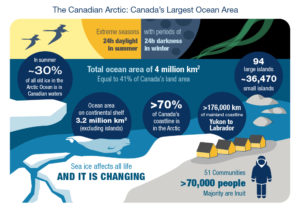Sunday, July 6, 2025
The Minister of Fisheries, Oceans and the Canadian Coast Guard, Bernadette Jordan, released a comprehensive and milestone report on the status and trends of the Arctic marine ecosystem on April 22, 2020.
“To protect and conserve the Arctic Ocean, we need to understand it, and that can only be done in full collaboration with Inuit and Northern partners who have a wealth of knowledge, experience and traditions to draw upon and gain new insight into the status of our Arctic Ocean,” said Jordan. “During these difficult times of social distancing, this report provides an opportunity for Canadians to learn more about the majestic beauty of our Arctic ecosystems and what we can all do to protect it. ”
The report, Canada’s Oceans Now: Arctic Ecosystems, 2019, is the second status report of the annual ocean series and the first to focus on the Arctic Ocean. Canada’s State of the Ocean reports are summaries of the current status and trends of the complex marine ecosystems in Canada’s three oceans.
The Arctic Ocean is Canada’s largest ocean area and it faces variable and changing conditions largely driven by global human-caused stressors, including climate change.

The report was co-authored by Fisheries and Oceans Canada, Environment and Climate Change Canada, the Government of Nunavut, and the Fisheries Joint Management Committee. It includes current knowledge and trends for Canadian Arctic marine ecosystems based on scientific findings and Inuit knowledge. It outlines observed sea ice-related ecosystem changes and provides new insight into varying environmental conditions and the connections between ocean and coastal areas.
According to the Fisheries Joint Management Committee (FJMC), the report demonstrates how the traditional knowledge of the Inuvialuit, their observations of change in ice patterns, weather, movements and habits of fish and marine mammals and their understanding of the interconnections of the Arctic ecosystems can, in collaboration with western science, work towards achieving that goal.
“Inuit Nunangat, the Inuit homeland in Canada, encompasses the entirety of Canada’s Arctic coastline, and our comprehensive land claims agreements are inclusive of large spans of ocean and ice,” says Natan Obed, president of the Inuit Tapiriit Kanatami. “So the health of the Arctic Ocean is directly related to Inuit health and wellbeing. We look forward to advancing work with Fisheries and Oceans Canada on the development of a new DFO Arctic Region which is inclusive of Inuit Nunangat and the Arctic Ocean, and welcome the release of this key report into the state of marine ecosystems.”
A report on the state of the Arctic Ocean will be released every four years. The national report on the state of all three of Canada’s oceans is expected to be released later in 2020. The Canadian Arctic has the largest ocean area in the country and would cover 41 per cent of Canada’s land area.
To read the complete report, click on the following links:
Public Report – Canada’s Oceans Now: Arctic Ecosystems, 2019
Infographics – Canada’s Oceans Now: Arctic Ecosystems, 2019











